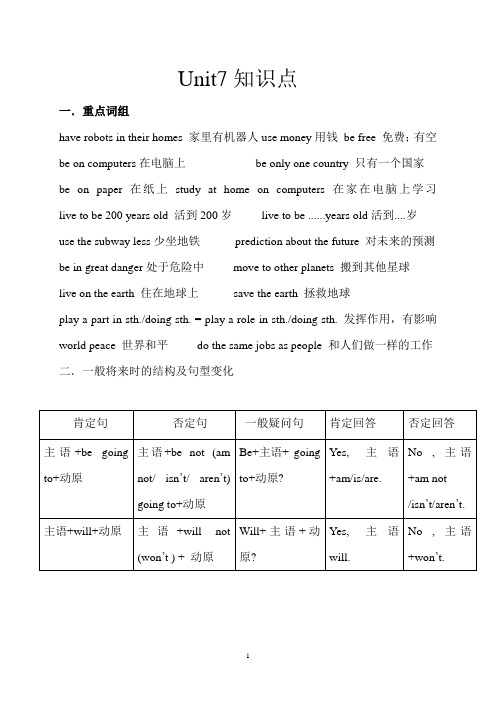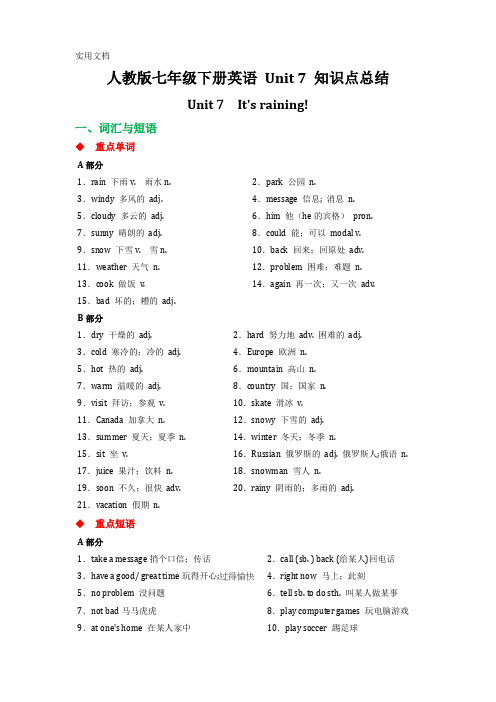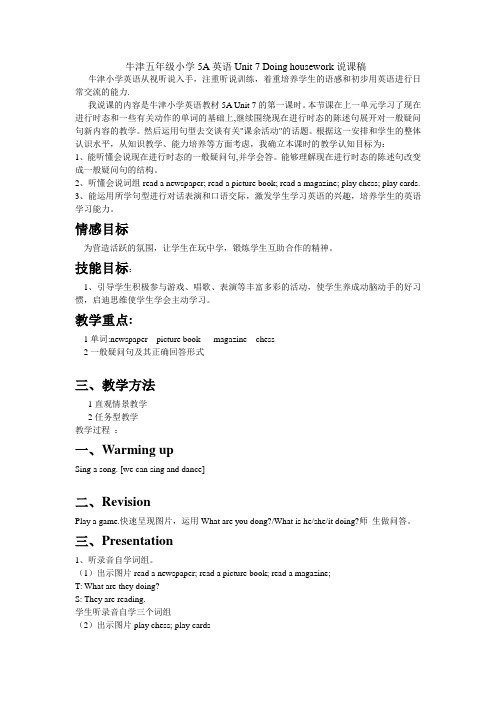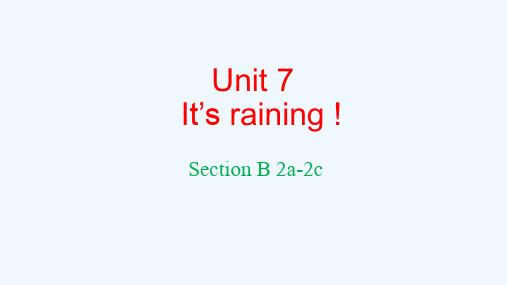unit 7 doing housework EDH
- 格式:ppt
- 大小:2.53 MB
- 文档页数:18

Unit7知识点一.重点词组have robots in their homes 家里有机器人use money用钱be free 免费;有空be on computers在电脑上be only one country 只有一个国家be on paper 在纸上study at home on computers 在家在电脑上学习live to be 200 years old 活到200岁live to be ......years old活到....岁use the subway less少坐地铁prediction about the future 对未来的预测be in great danger处于危险中move to other planets 搬到其他星球live on the earth 住在地球上save the earth 拯救地球play a part in sth./doing sth. = play a role in sth./doing sth. 发挥作用,有影响world peace 世界和平do the same jobs as people 和人们做一样的工作二.一般将来时的结构及句型变化肯定句否定句一般疑问句肯定回答否定回答主语+be going to+动原主语+be not (amnot/ isn’t/ aren’t)going to+动原Be+主语+ goingto+动原?Yes, 主语+am/is/are.No , 主语+am not/isn’t/aren’t.主语+will+动原主语+will not(won’t ) + 动原Will+主语+动原?Yes, 主语will.No , 主语+won’t.三.There be 句型的一般将来时结构及句型变化将下列句子变成一般将来时结构并变形1. People have robots in their homes.肯_________________________________________________________________________ 否_________________________________________________________________________ 疑_________________________________________________________________________2. People use money.----肯_________________________________________________________________________ 否_________________________________________________________________________ 疑_________________________________________________________________________3. Everything is free.-----肯_________________________________________________________________________ 否_________________________________________________________________________ 疑_________________________________________________________________________4. Kids go to school.----.肯_________________________________________________________________________ 否_________________________________________________________________________ 疑_________________________________________________________________________5. They study at home on computers.----.肯_________________________________________________________________________ 否_________________________________________________________________________ 疑_________________________________________________________________________6. There is only one country.----.肯_________________________________________________________________________ 否_________________________________________________________________________ 疑_________________________________________________________________________7.People live to be 200 years old.----.肯_________________________________________________________________________ 肯定句 否定句 一般疑问句 肯定回答 否定回答There is going to be+名词+其他 There isn ’t going to be+名词+其他 Isthere going to be+名词+其他?Yes, there is. No , there isn ’t There will be+名词+其他 There won ’t be+名词+其他 Will there be+名词+其他?Yes, there will. No,there won ’t.否_________________________________________________________________________ 疑_________________________________________________________________________ 8. There are fewer people.----.肯_________________________________________________________________________ 否_________________________________________________________________________ 疑_________________________________________________________________________ 9. There is less free time----.肯_________________________________________________________________________ 否_________________________________________________________________________ 疑_________________________________________________________________________ 10.There is more pollution----.肯_________________________________________________________________________ 否_________________________________________________________________________ 疑_________________________________________________________________________ 11. Cities are very big and crowded.----.肯_________________________________________________________________________ 否_________________________________________________________________________ 疑_________________________________________________________________________ 12. People use the subway less.----.肯_________________________________________________________________________ 否_________________________________________________________________________ 疑_________________________________________________________________________ 13. More robots do the same jobs as people.----.肯_________________________________________________________________________ 否_________________________________________________________________________ 疑_________________________________________________________________________ 14. People build more buildings in the country----.肯_________________________________________________________________________ 否_________________________________________________________________________ 疑_________________________________________________________________________ 15. People have more free time ---.肯_________________________________________________________________________ 否_________________________________________________________________________ 疑_________________________________________________________________________四.重点句型1.What will the future be like? 将来是什么样的?将来会变成什么样?2.What’s your prediction about the future? 你对未来的预测是什么?3.People will have robots in their homes.People won’t use money. Everything will be free.Kids won’t go to school. They will study at home on computers. There will be only one country. People will live to be 200 years old. There will be fewer people. There will be less free time.There will be more pollution. Cities will be very big and crowded. People will use the subway less.More robots will do the same jobs as people.People will build more buildings in the country.People will have more free time. Cities will be more crowded and polluted. There will be fewer trees and the environment will be in great danger.Will we have to move to other planets? I want to live on the earth. Everyone should play a part in saving the earth.五.词语意义原级最高级用法more 更多的many/ much most 修饰可复和不可数名词less 更少的little least 修饰不可数名词fewer 更少的few fewest 修饰可数名词复数六.Everyone should play a part in saving the earth.should是_____动词,后跟_________.play a part in sth./ doing sth. =________________参与某事,在....中起作用。

人教版七年级下册英语Unit 7 知识点总结Unit 7 It's raining!一、词汇与短语◆重点单词A部分1.rain 下雨v. 雨水n.2.park 公园n.3.windy 多风的adj.4.message 信息; 消息n.5.cloudy 多云的adj.6.him 他(he的宾格)pron. 7.sunny 晴朗的adj.8.could 能;可以modal v.9.snow 下雪v. 雪n.10.back 回来;回原处adv. 11.weather 天气n.12.problem 困难;难题n. 13.cook 做饭v.14.again 再一次;又一次adv. 15.bad 坏的;糟的adj.B部分1.dry 干燥的adj.2.hard 努力地adv. 困难的adj.3.cold 寒冷的;冷的adj.4.Europe 欧洲n.5.hot 热的adj.6.mountain 高山n.7.warm 温暖的adj.8.country 国;国家n.9.visit 拜访;参观v.10.skate 滑冰v.11.Canada 加拿大n.12.snowy 下雪的adj.13.summer 夏天;夏季n.14.winter 冬天;冬季n.15.sit 坐v.16.Russian 俄罗斯的adj. 俄罗斯人;俄语n. 17.juice 果汁;饮料n.18.snowman 雪人n.19.soon 不久;很快adv.20.rainy 阴雨的;多雨的adj. 21.vacation 假期n.◆重点短语A部分1.take a message捎个口信;传话2.call (sb. ) back (给某人)回电话3.have a good/ great time玩得开心;过得愉快4.right now 马上;此刻5.no problem 没问题6.tell sb. to do sth. 叫某人做某事7.not bad马马虎虎8.play computer games 玩电脑游戏9.at one's home 在某人家中10.play soccer 踢足球11.study Chinese 学习汉语12.talk on the phone 通电话13.three hours 三个小时14.every day 每天B部分1.by the pool 在游泳池边2.study hard 努力学习3.have fun 玩得高兴4.on (a) vacation 度假5.write to sb. 给某人写信6.take a photo拍照7.call sb. at...... 给某人打电话,号码是......8.in the picture 在图画里9.go to summer school去暑期培训学校10.sit by...... 坐在......旁边11.drink orange juice 喝橙汁12.learn a lot学到很多东西13.in Europe 在欧洲14.summer vacation 暑假15.in the mountains 在山里16.write to sb. 给某人写信17.right for 适宜于18.next month 下个月19.in the snow 在雪中20.play ping-pong 打乒乓球21.in the rainy weather 在下雨天◆重点句子A部分1.—What are you doing? 你在干什么?—I'm cooking. 我在做饭。

七年级英语下册 Unit 7知识点鲁教版A.短语1.洗碗do the dishes (=wash the dishes)2.扫地sweep the floor3.倒垃圾take out the trash4.铺床/ 整理床铺make your bedmake one’s bed5.折叠衣服fold your clothes6.打扫起居室clean the living room7.让某人搭便车give sb a ride8.开会have a meeting9.忙于做某事work on / be busy with sth10. 在外呆到很晚stay out late11.做家务do chores=do housework 12. 讨厌做…hate to do …/doing…13.做早餐 make breakfast14.洗车wash the car15.呆在外边be outside =stay outside16.买些饮料和小吃 buy some drinks and snacks17.向某人借某物borrow sth from sb(从…)借些钱 borrow some money(from sb.)18.洗衣服do the laundry =wash the clothes19.邀请某人去某地invite sb to somewhere20.去商店go to the store 21.买饮料和零食buy drinks and snacks22.照顾照看…take care of … =look after23.带某人做某事take sb for sthtake him for a walk24.给某人某物give sb sth / give sth to sb25. 忘记要去干forget to do sthforget doing sth. 忘记做过某事26.和…玩play with …27. 搬新家move to a new house28.向某人寻求帮助ask sb for help 29.饲养狗feed dogs30. be/ get angry (with sb.) 生某人的气31.英语课外作业English project32.去度假go on vacation 33.需要一些帮助need some help34.以…为食feed on…35. have/hold school party 举行学校晚会36. go to a meeting 去参加会议37. stay out late 在外面呆到很晚38. have/take a test 参加考察,进行测试B. B.句子1. Could you please take out the trash?请把垃圾拿出去好吗?2. --Could I use (borrow) your computer?我能借用一下你的电脑吗?--Sorry. I'm going to work on it now.抱歉,我正准备用它呢。

牛津五年级小学5A英语Unit 7 Doing housework说课稿牛津小学英语从视听说入手,注重听说训练,着重培养学生的语感和初步用英语进行日常交流的能力.我说课的内容是牛津小学英语教材5A Unit 7的第一课时。
本节课在上一单元学习了现在进行时态和一些有关动作的单词的基础上,继续围绕现在进行时态的陈述句展开对一般疑问句新内容的教学。
然后运用句型去交谈有关"课余活动"的话题。
根据这一安排和学生的整体认识水平,从知识教学、能力培养等方面考虑,我确立本课时的教学认知目标为:1、能听懂会说现在进行时态的一般疑问句,并学会答。
能够理解现在进行时态的陈述句改变成一般疑问句的结构。
2、听懂会说词组read a newspaper; read a picture book; read a magazine; play chess; play cards.3、能运用所学句型进行对话表演和口语交际,激发学生学习英语的兴趣,培养学生的英语学习能力。
情感目标为营造活跃的氛围,让学生在玩中学,锻炼学生互助合作的精神。
技能目标:1、引导学生积极参与游戏、唱歌、表演等丰富多彩的活动,使学生养成动脑动手的好习惯,启迪思维使学生学会主动学习。
教学重点:1单词:newspaper picture book magazine chess2一般疑问句及其正确回答形式三、教学方法1直观情景教学2任务型教学教学过程:一、Warming upSing a song. [we can sing and dance]二、RevisionPlay a game.快速呈现图片,运用What are you dong?/What is he/she/it doing?师生做问答。
三、Presentation1、听录音自学词组。
(1)出示图片read a newspaper; read a picture book; read a magazine;T: What are they doing?S: They are reading.学生听录音自学三个词组(2)出示图片play chess; play cardsT: What are they doing?S: They are playing.学生听录音自学二个词组2、新授一般疑问句式(逐个呈现四幅新授图片,师生问答)Drill1:T: Is Mr Green reading a newspaper?S: 根据图上的内容学生自己作出肯定回答。


七年级上次unit7知识点总结本篇文章将对七年级上次unit7的重点进行总结,帮助同学们更好地回顾和巩固所学知识。
一、动词的现在进行时态现在进行时态表示目前正在进行的动作或状态。
它由“be + 动词的现在分词”构成。
例如:- I am eating a sandwich.(我正在吃三明治。
)- She is playing basketball.(她正在打篮球。
)二、介词的用法介词是一种十分重要的词类,它通常用来表示名词或代词与其他词之间的关系。
在本单元的学习中,主要涉及以下几种用法:1. 表示时间、地点或方向的介词- at / in / on:分别表示某一时刻、某一地点或某一日子/日期。
- to / from:分别表示到达某地和离开某地的方向。
- behind / in front of:分别表示在某物品的后面和前面。
例如:- My class starts at 8 o'clock.(我的课程从早上8点开始。
)- They are playing soccer in the park.(他们正在公园里踢足球。
)- I am going to the bookstore.(我要去书店。
)- The station is behind the supermarket.(车站在超市的后面。
)2. 表示方式的介词- with:表示使用某种方式。
- by:表示通过某种途径。
- She writes with a pen.(她用钢笔写字。
)- They go to school by bike.(他们骑自行车去学校。
)三、短语动词的用法短语动词是由一个动词和一个或多个介词、副词、形容词或动词构成的组合形式。
在本单元中,主要学习了以下几个常用的短语动词:1. look after:照顾例如:- My sister looks after my grandma.(我姐姐照顾我奶奶。
)2. clean up:清理、整理- Please clean up your room.(请整理你的房间。
7年级英语书下册unit7知识点总结英语是世界上最主要的语言交际工具,既然是工具就别想得太难,工具总是能被人掌握的。
接下来店铺为你整理了7年级英语书下册unit7知识点总结,一起来看看吧。
7年级英语书下册unit7知识点总结【1】一.单词复习(写出英语单词):1. v.下雨 n.雨水 20. adj热的2. adj.多风的 21. adj温暖的3. adj多云的 22. v.拜访;参观4. adj晴朗的 23. n.加拿大5. v.下雪;雪 24. n.夏天;夏季6. n.天气 25. v.坐7. v.做饭 26. n.果汁;饮料8. adj坏的;糟的 27. adv.不久;很快9. n.公园 28. n.假期10. n.信息;消息 29. on(a)vacation度假11. 捎口信;传话 30. adv.努力地;困难的12. pron.他(he的宾格) 31. n.欧洲13. v.能;可以 32. n.高山14. ad.回来;回原处 33. n.国;国家15. 回电话 34. v.滑冰16. n.困难;难题 35. adj.下雪的17. adj.再一次;又一次 36. n.冬天;冬季18. adj.干燥的 37. adj.俄罗斯的;俄罗斯人;俄语19. adj寒冷的;冷的 38. n.雪人39. adj.阴雨的;多雨的Joe乔(男名)Jeff杰夫(男名)Moscow莫斯科Toronto多伦多Boston波士顿7年级英语书下册unit7知识点总结【2】二. 熟记下列词组1,be sunny/cloudy /rainy/snowy /windy 天气晴朗/ 多云/下雨/下雪/ 刮风 2,Take a message for sb 给某人捎口信Leave a message to sb 给某人留言3,call sb back 给sb. 回某人电话4,call sb. up 给某人打电话5,no problem 没问题6,sound like = It sounds like 听起来像look like 看起来像7,have a good time (in) doing sth 很开心做某事= have fun (in) doing sth.= enjoy oneself (in) doing sth8,can’t solve this problem 无法解决这个问题9,work out this math problem 解出这道数学难题10. —Thanks for all your help . 感谢你所有的帮助。
七下英语第7单元笔记Notes for Unit 7, Grade 7 English.Topic: Life in the Future.Vocabulary:1. Robot A machine designed to perform tasks automatically, especially one programmable for a variety of functions.2. Housework The tasks involved in maintaining a home, such as cleaning, cooking, and laundry.3. Do the laundry To wash and dry clothes.4. Shop To purchase goods or services from a store.5. Cook To prepare food for eating.6. Free Not occupied or engaged; available.7. Bored Feeling tired or uninterested because there is nothing to do or nothing exciting happening.8. Everywhere In or to every place; everywhere present.9. Human Belonging to or characteristic of human beings.10. Shape The form or structure of something.Phrases and Expressions:1. In the future Referring to a time in the distant or near future.2. Be able to Have the capability or skill to do something.3. Be like Similar to or resembling.4. First of all Used to introduce the first point orreason in a list or argument.5. Agree with To have the same opinion or belief as someone else.6. Disagree with To have a different opinion or belief from someone else.7. Live to be To survive or exist for a specifiedperiod of time.8. Hundreds of A large number of, specifically morethan 100 but not necessarily a specific number.9. Less and less Becoming increasingly smaller or fewer.10. More and more Becoming increasingly larger or more frequent.Grammar:Future Simple Tense: Used to express actions or statesthat will happen in the future. Constructed using "will" + verb in the base form. Example: "I will go to the store tomorrow."Modal Verbs: Verbs that express possibility, necessity, ability, permission, or obligation. "Will" is a modal verb used to express future actions or decisions.Present Simple Tense: Used to express habitual actions or general truths. Constructed using the base form of the verb. Example: "She always does her homework after dinner."Lesson Content:Section 1: Life in the Future with Robots.Topic introduction: Discussion about the potentialrole of robots in people's lives in the future.Vocabulary introduction: Learning new vocabularyrelated to robots and their functions.Grammar focus: Practicing the use of the future simple tense to describe future scenarios with robots.Activities: Role-playing conversations about using robots for different tasks, such as doing housework, shopping, and cooking.Section 2: Agreeing and Disagreeing.Topic introduction: Discussion about agreeing and disagreeing with opinions about life in the future.Vocabulary introduction: Learning new vocabulary related to agreeing and disagreeing.Grammar focus: Practicing the use of modal verbs to express agreement or disagreement.Activities: Participating in a debate or discussion about whether robots will make life better or worse in the future.Section 3: Life Expectancy.Topic introduction: Discussion about life expectancy and how it may change in the future.Vocabulary introduction: Learning new vocabulary related to life expectancy and health.Grammar focus: Reviewing the present simple tense to describe current trends and predictions for the future.Activities: Conducting a survey or interview to gather opinions about expected lifespan and quality of life in the future.Section 4: The Future of Work.Topic introduction: Discussion about the potential changes in the world of work in the future.Vocabulary introduction: Learning new vocabulary related to jobs and the workplace.Grammar focus: Practicing the use of the future simple tense to predict future trends in employment.Activities: Brainstorming ideas about new types of jobs that may emerge in the future and discussing their potential impacts on society.Additional Resources:Online dictionaries for vocabulary lookup and definitions.Practice worksheets and exercises to reinforce grammar concepts.Interactive games and quizzes to test knowledge and retention.Podcasts or videos about future trends and predictions for additional context and information.Conclusion:Unit 7 of Grade 7 English focuses on the topic of life in the future, specifically exploring the role of robots, agreeing and disagreeing with opinions, life expectancy, and the future of work. Students learn new vocabulary, practice grammar concepts, and engage in activities that help them apply their knowledge to real-world scenarios. Additional resources provide opportunities for further exploration and reinforcement of the material covered in the unit.。